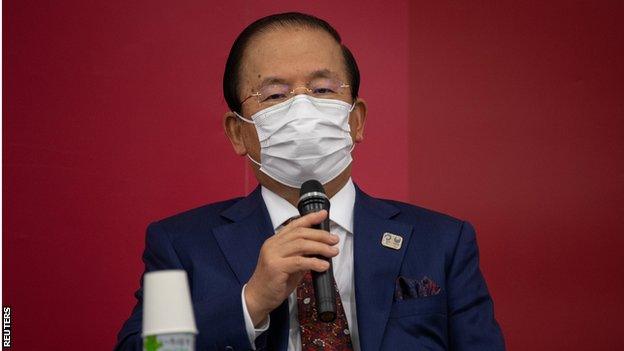Tokyo 2020: Games organisers see budget increase for delayed event
- Published

Muto remains confident that the Games will go ahead in Japan next year
Organisers of the delayed Tokyo Olympic and Paralympic Games will spend $900m (£670m) on measures to stop the spread of coronavirus at next year's events.
The final budget means the Games will cost $15.9bn (£11.8bn) - up $2.8bn (£2.1bn) from figures last year.
It could make the Tokyo Games the most expensive summer Olympics in history.
"Whether you see this budget as expensive or not depends on how you look at it," said Tokyo 2020 chief executive Toshiro Muto.
"You can look at it from a cost perspective or an investment perspective. If you look at it purely in terms of cost, it doesn't make sense.
"But if you look at it as a positive investment, I think there are areas where it can be identified as such."
The coronavirus plans include the creation of an infection control centre in the Olympic and Paralympic Village, as well as plans to regularly test athletes and ban cheering in venues.
A poll last week by national broadcaster NHK showed that the majority of the Japanese general public oppose holding the Games next year, favouring a further delay or outright cancellation of the event.
But organisers insist the Games can be held, and have ruled out another delay.
Games elements, including athlete welcome ceremonies, have been scrapped in a bid to save money and the "look" of the event will also be scaled back.
But the savings, plus extra revenue from sponsors, have been cancelled out by extra costs including rebooking venues and transport to retaining the huge organising committee staff.
Organisers increased the service budget of the Games to $7.1bn (£5.3m), with extra money allotted for the opening and closing ceremonies.
However, the International Olympic Committee has agreed to cover the costs of moving the marathon and race-walking to northern Sapporo to beat Tokyo's summer heat.
"We are trying to hold a global event during a pandemic, and if we are able to do that, it would mean that we can co-exist with Covid-19," added Muto.
"We would be able to provide a model for living with the virus, and I think in that sense this event can be a meaningful one."